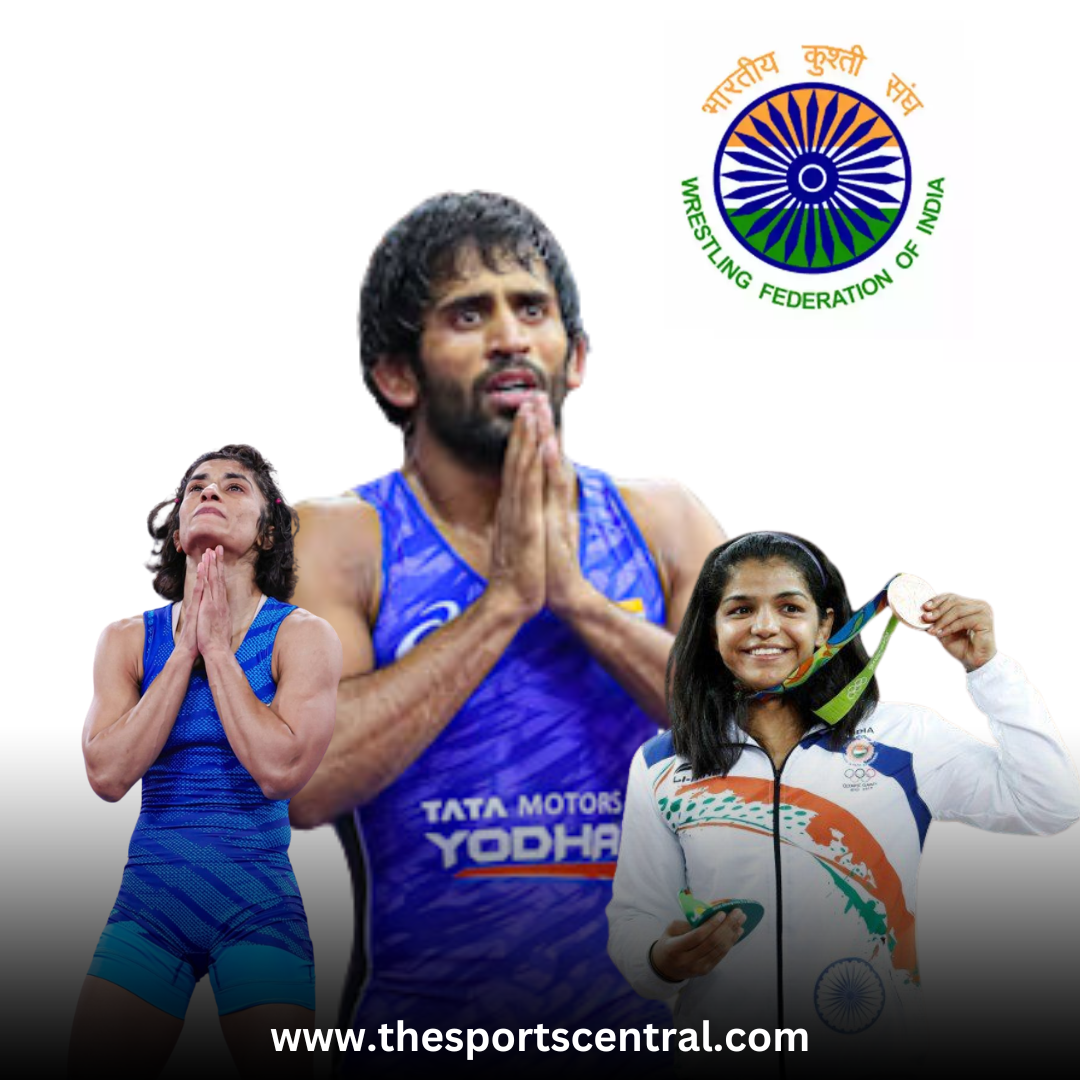The world of sports, while often a celebration of human achievement, discipline, and resilience, can sometimes be overshadowed by controversies, politics, and deep personal conflicts. One such instance arose within the Indian wrestling community in recent years, following a protest that shook the foundations of the Wrestling Federation of India (WFI). Led by prominent athletes like Sakshi Malik, Vinesh Phogat, and Bajrang Punia, the protest aimed to address alleged sexual harassment by former WFI chief Brij Bhushan Sharan Singh. However, as time passed, the unity that once brought these wrestlers together began to crack. This article explores the issues that emerged during the protest, the controversies surrounding exemptions from the 2023 Asian Games trials, and how these events have impacted the image of Indian wrestling.
The Origins of the Wrestlers’ Protest
In 2023, a significant storm hit the Indian wrestling community. Sakshi Malik, Vinesh Phogat, and Bajrang Punia, three of India’s most prominent wrestlers, became the faces of a movement demanding justice for women athletes who had allegedly faced sexual harassment at the hands of Brij Bhushan Sharan Singh, then the head of the WFI. The protest received national attention, not only because of the gravity of the allegations but also because of the stature of the athletes involved.
These athletes had represented India on the international stage, winning numerous accolades, including Olympic medals, Commonwealth Games titles, and World Championship honors. Their involvement in the protest added credibility to the cause and rallied public support. The protest was not just about wrestling; it became a symbol of the larger struggle against harassment and abuse in Indian sports.
Sakshi Malik’s Perspective: A Rigid Stand for Principles
Sakshi Malik, who won a bronze medal at the 2016 Rio Olympics, has always been a strong advocate for integrity and fairness. In her recently released book, Witness, she reflects on the protest, particularly emphasizing the disillusionment that set in when fellow protestors Bajrang Punia and Vinesh Phogat accepted an exemption from trials for the 2023 Asian Games in Hangzhou. This exemption was granted by an ad-hoc committee, and it quickly became a point of contention within the wrestling community.
In her book, Sakshi writes, “The old way of thinking selfishly was taking over once again. The people close to Bajrang and Vinesh had started filling their minds with greed. Now they were talking about this exemption from trials for the Games.”
Sakshi’s words reveal her disappointment and frustration with the decisions made by her colleagues. The protest, which had begun as a unified front against a powerful individual accused of serious misconduct, began to fracture as personal ambitions and external influences seemingly took over. According to Sakshi, the decision to accept the exemption hurt the image of the protest and cast doubt on the motivations behind it.
The Exemption Controversy: A Turning Point in the Protest
The exemption from trials for the 2023 Asian Games sparked intense debate within Indian sports. Trials, which are standard in selecting athletes for major international events, are meant to ensure that only the best-performing athletes at that moment represent the country. By accepting an exemption, Bajrang and Vinesh found themselves at the center of a controversy that questioned not only their sportsmanship but also their commitment to the ideals of fairness and equality that the protest initially stood for.
Sakshi writes, “Nothing good came of Bajrang and Vinesh’s decision to take the exemption…their decision badly hurt the image of our protest. It put us in a situation where many supporters started to think that we were actually in the protest for selfish reasons.”
The perception that the protest had devolved into a vehicle for personal gain rather than a fight for justice was damaging. Public sentiment began to shift, and many who had initially supported the wrestlers’ cause started to question their true motivations. While Sakshi remained steadfast in her belief that the protest was about justice for the victims of harassment, the actions of her colleagues clouded that message.
The Role of Vinesh Phogat and Bajrang Punia
Vinesh Phogat and Bajrang Punia are two of India’s most celebrated wrestlers. Vinesh, a trailblazer in women’s wrestling, has multiple Commonwealth Games and Asian Games gold medals to her name, while Bajrang is a two-time Olympic medalist and a dominant force in his weight class. Their involvement in the protest was crucial in giving it the visibility it needed. However, their decisions, particularly around the exemption from trials, became a focal point of criticism.
Vinesh’s disqualification from the Women’s 50kg Wrestling gold medal match in the Asian Games due to being 100 grams overweight added to the controversy. Critics argued that had Vinesh competed in the trials, this oversight might have been avoided. It also raised questions about whether the exemption truly served the best interests of Indian wrestling or if it was a decision driven by other factors.
Sakshi, in her book, does not shy away from addressing these issues. She writes about how the people close to Vinesh and Bajrang began to influence their decisions, suggesting that greed and selfishness had overtaken the ideals that initially drove the protest.
Babita Phogat’s Alleged Involvement
In addition to the internal divisions among the protest leaders, Sakshi’s book also touches upon the role of Babita Phogat, a former Commonwealth Games gold medalist-turned-BJP politician. Babita’s involvement in the protest was seen by some as a strategic move, while others believed that her political affiliations might have compromised her commitment to the cause.
Sakshi reflects on this in Witness, stating, “In hindsight, while I know that ending Brij Bhushan Sharan Singh’s reign was the primary goal for Vinesh and Bajrang, I made the mistake of thinking that that was Babita’s sole intention too.”
Babita’s political connections, particularly with the ruling BJP, added another layer of complexity to the protest. Some viewed her presence as an attempt to gain political mileage, while others questioned whether her influence helped or hindered the movement. Sakshi’s reflections on Babita’s intentions suggest that, in her view, the protest may have been compromised by political agendas.
The Allegations Against Brij Bhushan Sharan Singh
At the heart of the protest were the allegations against Brij Bhushan Sharan Singh, the former chief of the Wrestling Federation of India. Singh, a powerful figure in Indian sports and politics, was accused of sexually harassing women wrestlers during his tenure. The allegations were serious and led to widespread calls for his removal and for a thorough investigation into his conduct.
The protest initially garnered widespread support from the public, athletes, and civil society groups. However, as the movement became mired in controversies surrounding exemptions and political affiliations, the focus began to shift away from the central issue—the need for justice for the victims of harassment.
The case against Brij Bhushan Sharan Singh is still being heard in a Delhi court, and while the outcome remains uncertain, the impact of the protest on Indian wrestling is undeniable. The athletes involved in the protest risked their careers and reputations by standing up to a powerful figure. Yet, the internal divisions and external pressures that emerged during the movement have cast a long shadow over their efforts.
The Political Turn: Vinesh and Bajrang Join the Congress Party
In a surprising turn of events, both Vinesh Phogat and Bajrang Punia joined the Indian National Congress (INC) party before the Haryana assembly elections. This move, coming in the wake of the protest and the Asian Games exemption controversy, raised eyebrows. Critics questioned whether their involvement in politics was a natural progression of their activism or a calculated move to secure their future in a different arena.
Vinesh’s victory in the Julana seat in the Haryana Assembly election, despite her disqualification in the Asian Games, cemented her political rise. However, it also further blurred the lines between her role as an athlete and an activist, raising questions about the motivations behind her involvement in the protest.
The Aftermath: A Fractured Movement
As Sakshi Malik reflects in Witness, the decision by Vinesh and Bajrang to accept the exemption from the 2023 Asian Games trials marked a turning point in the protest. What began as a unified movement seeking justice for victims of harassment devolved into a fractured and controversial affair, with questions surrounding the motivations of its leaders.
Sakshi’s reflections highlight the complexities of activism, particularly when it intersects with personal ambitions and external influences. The protest against Brij Bhushan Sharan Singh was a brave and necessary stand, but the controversies that emerged along the way have left a lasting impact on Indian wrestling.
Conclusion: A Legacy Tarnished or Strengthened?
The protest led by Sakshi Malik, Vinesh Phogat, and Bajrang Punia was a significant moment in Indian sports. It exposed the deep-rooted issues of harassment and abuse that have plagued not just wrestling but many other sports in the country. However, the internal divisions, the controversy surrounding the exemption from trials, and the political affiliations of its leaders have complicated the narrative.
For Sakshi, the protest remains a deeply personal experience, one that she feels was compromised by the actions of her colleagues. In Witness, she offers a candid and reflective account of what transpired, emphasizing the need for integrity and unity in the fight for justice. Whether the protest will ultimately be remembered for its achievements or its controversies remains to be seen, but there is no denying the courage it took for these athletes to stand up against a powerful institution.
As the case against Brij Bhushan Sharan Singh continues, the legacy of the protest and its impact on Indian wrestling will remain a subject of debate. What is clear, however, is that the athletes involved—Sakshi Malik, Vinesh Phogat, and Bajrang Punia—have forever changed the landscape of Indian sports activism, for better or worse.









